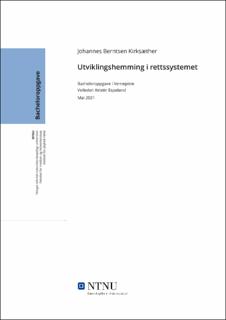| dc.contributor.advisor | Espeland, Kristin | |
| dc.contributor.author | Kirksæther, Berntsen, Johannes | |
| dc.date.accessioned | 2021-09-25T16:45:54Z | |
| dc.date.available | 2021-09-25T16:45:54Z | |
| dc.date.issued | 2021 | |
| dc.identifier | no.ntnu:inspera:81471222:34431259 | |
| dc.identifier.uri | https://hdl.handle.net/11250/2783479 | |
| dc.description.abstract | Hensikt: Hensikten med oppgaven er å se på hvordan mennesker med utviklingshemming kan ivaretas i rettssystemet. Oppgaven tar utgangspunkt i erfaringer ansatte i rettssystemet har fra sine møter med personer med utviklingshemming.
Metode: Litteraturstudie er oppgavens metode og støtter seg på fem forskjellige vitenskapelige artikler samt annen relevant litteratur.
Resultat: De valgte artiklene gir innblikk i hvilke erfaringer ansatte i rettssystemet har fra sine møter med utviklingshemming. Resultatene i de valgte artiklene danner grunnlag for to tema som blir diskutert i oppgaven; 1. Betydningen av å Identifisere utviklingshemming, 2. Behovet for kunnskap om utviklingshemming.
Konklusjon: Oppgaven kommer frem til tiltak som kan bidra til å ivareta mennesker med utviklingshemming i rettssystemet. Implementering av screeningverktøy for å oppdage utviklingshemming på et tidlig stadie, det kan føre til at flere går uoppdaget, forpliktelser til CRPD holdes og at rettigheter blir ivaretatt. Det å øke kunnskapen om utviklingshemming blant ansatte i rettssystemet, blir også trukket frem som ett mulig tiltak, grunnen til det er å sikre at flere får forståelse for diagnosen og at personer med utviklingshemming ivaretas ved å få rett type hjelp.
Nøkkelord: Utviklingshemming, rettssystemet, CRPD, ivaretakelse, erfaring | |
| dc.description.abstract | Purpose: The aim of this study was to identify ways to support people with intellectual disabilities in the criminal justice system. The study looks at the experiences professionals have from working with people who have an intellectual disability. The purpose of looking at these experiences is to identify ways to support people with intellectual disability in the criminal justice system.
Method: Litterateur study is the chosen methodology, and uses five different scientific articles, which have been analyzed, in addition to these, other types of relevant litterateur has also been used.
Results: The chosen scientific articles gives an insight of the employees in the criminal justice system and their experiences with people who have an intellectual disability. The results from these articles are used to identify two themes which are discussed; 1. The impact of Identification of intellectual disability, 2. The need for more knowledge about intellectual disability.
Conclusion: This study suggests different measures which can contribute to support people with intellectual disability in the criminal justice system. Implementation of screening tools could help identify the diagnosis in the early stages and make it so that the persons need are accounted for in the criminal justice. Focus on more knowledge about intellectual disability for the professionals in the criminal justice system, is seen as measure which can increase the understanding of the diagnose and help secure that people with intellectual disability gets the right type of help.
Key words: Intellectual disability, criminal justice system, CRPD, support, experience | |
| dc.language | nob | |
| dc.publisher | NTNU | |
| dc.title | Utviklingshemming i rettssystemet | |
| dc.type | Bachelor thesis | |
